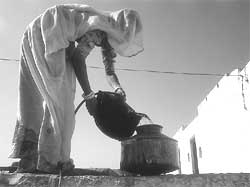Quenching parched throats

FOR THE PEOPLE , BY THE PEOPLE
So far, the planners have done their best to leave communities out while conceiving projects. It has not worked, India needs to give water back to its people, the planners need to involve the masses.
Almost all the countries that face a water crisis today can trace the roots of this to the discontinuity in their water management strategy since the 19th century. In most cases, the State has emerged as the water provider, replacing communities and households as the primary agents.
After innumerable faulty projects, the government agencies have now realised that if they want the water programmes to succeed, things have to change. More crucially, community participation is one of the most important elements India's policymakers need to address. "There is need for a supply-driven approach rather than a demand-driven approach,' Hashim explains.
Community participation in most of the water supply schemes is zero. "The state supply agencies are merely engineering bodies and they do not understand the social issues involved, or the needs of the people,' says Norden. Even an expert committee report of the ministry of rural areas and employment commented on the lack of people's participation: "The community was not made aware of its entitlements
